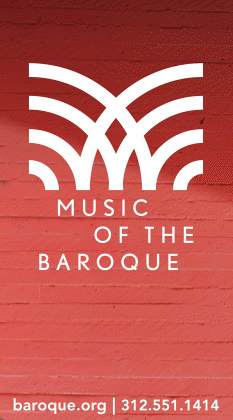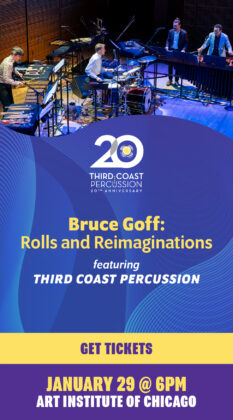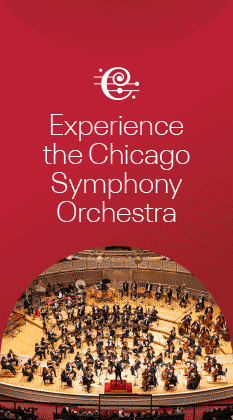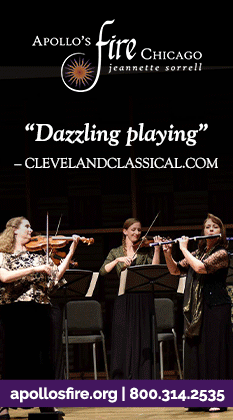Van Zweden and CSO give new luster to Bartók classic
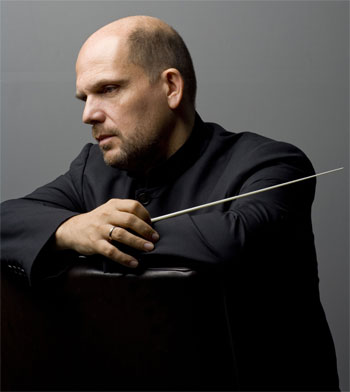
There was something of a family aura to Thursday night’s Chicago Symphony Orchestra concert. Not only was there the presence of Mason Bates, Riccardo Muti’s pick as co-composer-in-residence, but the CSO debut of David Fray, the French pianist who is also Muti’s son-in-law.
There was also Dutch conductor and former Concertgebouw concertmaster Jaap van Zweden, who has become a welcome dynamic and regular force as a CSO guest conductor downtown — and more recently at Ravinia — since first filling in as a sub back in 2008. Lastly, there was the stalwart Bartók Concerto for Orchestra, a piece long associated with the CSO and being performed as part of the season-long Sir Georg Solti centennial celebration.
Bates’ Liquid Interface opened the evening and, as a piece about water, was being performed for the first time by the CSO as part of the orchestra’s ongoing Rivers Festival.
Originally commissioned by Leonard Slatkin and the National Symphony Orchestra and premiered by those forces in 2007, the 23-minute work is scored for electronica and large orchestra, the orchestra essentially serving as large-scale ambience and accompaniment for sometimes abstract, sometimes discernible computer sounds that were primarily used as a backbeat.
The opening, for instance, sounded like thunder, but is in actuality a sample of a glacier breaking open. This gave way to high sustained strings until Bates himself entered, sitting at the back of the stage with two laptops and a computer keyboard that he percussively chopped away at as if he were playing a Prokofiev concerto.
Van Zweden, for his part, had a monitor by his podium at arm’s reach and took care to signal the volume of the electronica with a hand twist while controlling the nuanced dynamics of the orchestra with the baton.
Like so many of the pieces we have heard from Bates, it all comes across as a worthy idea that goes on much too long and is far too dependent on the sheer novelty of crossover rather than having something substantial to say.

Sitting on a standard chair rather than a piano bench and crossing his arms when he was not playing, David Fray performed the Mozart Piano Concerto No. 20 in D minor, K. 466 in a rather idiosyncratic manner, an approach fully supported by van Zweden and his large orchestra, at least by Mozart standards.
The orchestral opening was dark and brooding, van Zweden bringing out the angst of the music with lots of rubato, similar to the approach of Fray when he entered as over-conspicuous soloist. Even the Romanza movement never seemed to become quiet nor introspective enough, the over-Romanticized cadenzas taken — in the first movement by Paul Badura-Skoda and the finale by Edwin Fischer — further emphasizing Fray’s over-emotive Beethovenesque approach.
Bartók’s Concerto for Orchestra was first performed by the CSO four years after its 1944 world premiere and has been recorded by the orchestra no less than six times over the years.
Given that two past CSO music directors, Fritz Reiner and Sir Georg Solti, were both Hungarian compatriots of Bartók who knew him and performed and recorded the piece in iconic recordings with the CSO — in addition to Pierre Boulez’s significant recording — van Zweden certainly had a long shadow in front of him in performing this work.
Nonetheless, some brass section overplaying and principal horn blurbs aside, this was a performance worthy of that extraordinary legacy. Van Zweden seemed to pool the transparency of Boulez with the passion of Solti, a formidable combination, with many distinctive and imaginative touches of his own.
As is true of van Zweden’s Mahler, he not only recognizes the collage origins of much of Bartók’s music, but gives extraordinary life to these moments by carefully revealing them in their own sonoric terms.
Only a conductor who understands and loves the music of Shostakovich as van Zweden clearly does, for instance, would dare to conduct the fourth movement parody of the Seventh Symphony with such humor and irony, rather than the more usual crudeness and vulgarity, such that the playing actually elicited audience titters.
But the Hungarian folk music sections were no less convincing, van Zweden heading in and out of the lilting and accelerating rhythms with immense skill and treating the double-harp writing like a giant and often dreamlike dulcimer.
The program will be repeated 8 p.m. Friday and Saturday and 7:30 p.m. Tuesday. cso.org; 312-292-3000.
Posted in Uncategorized

